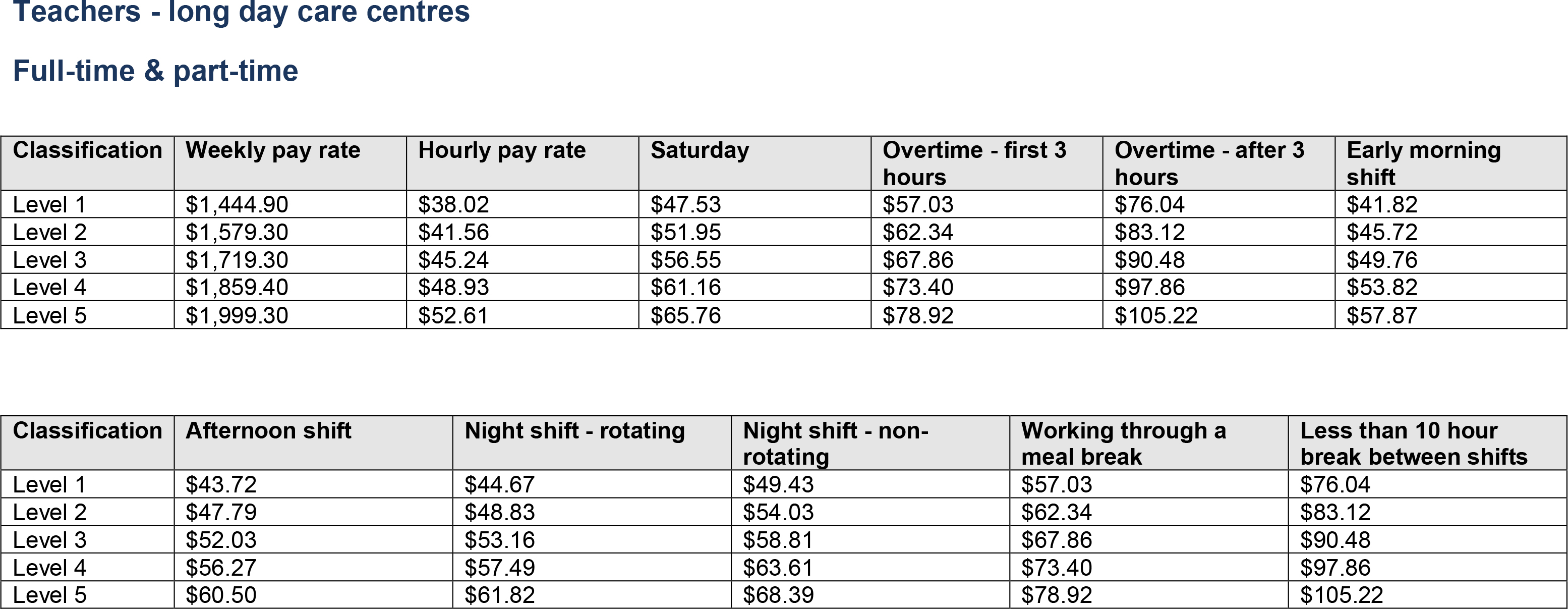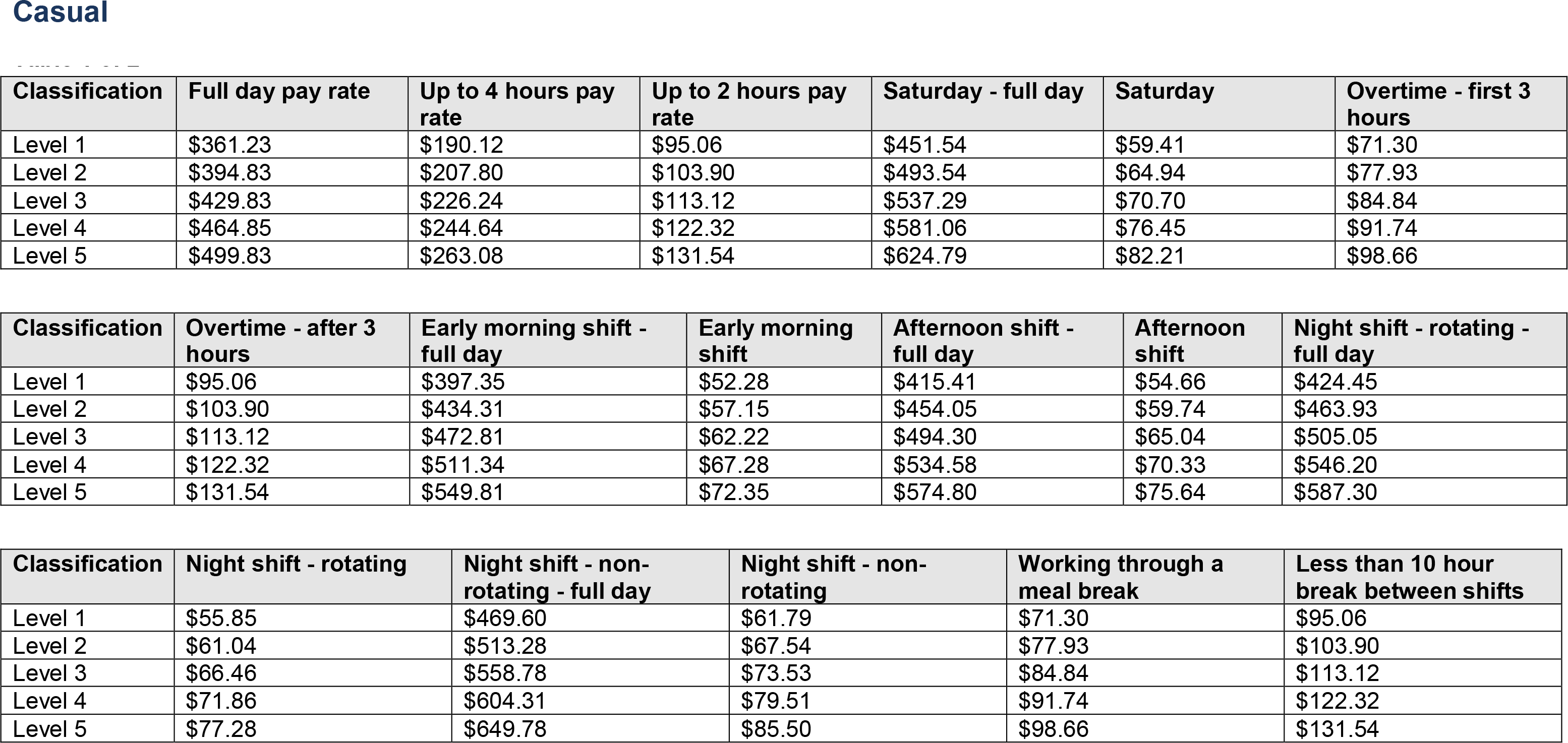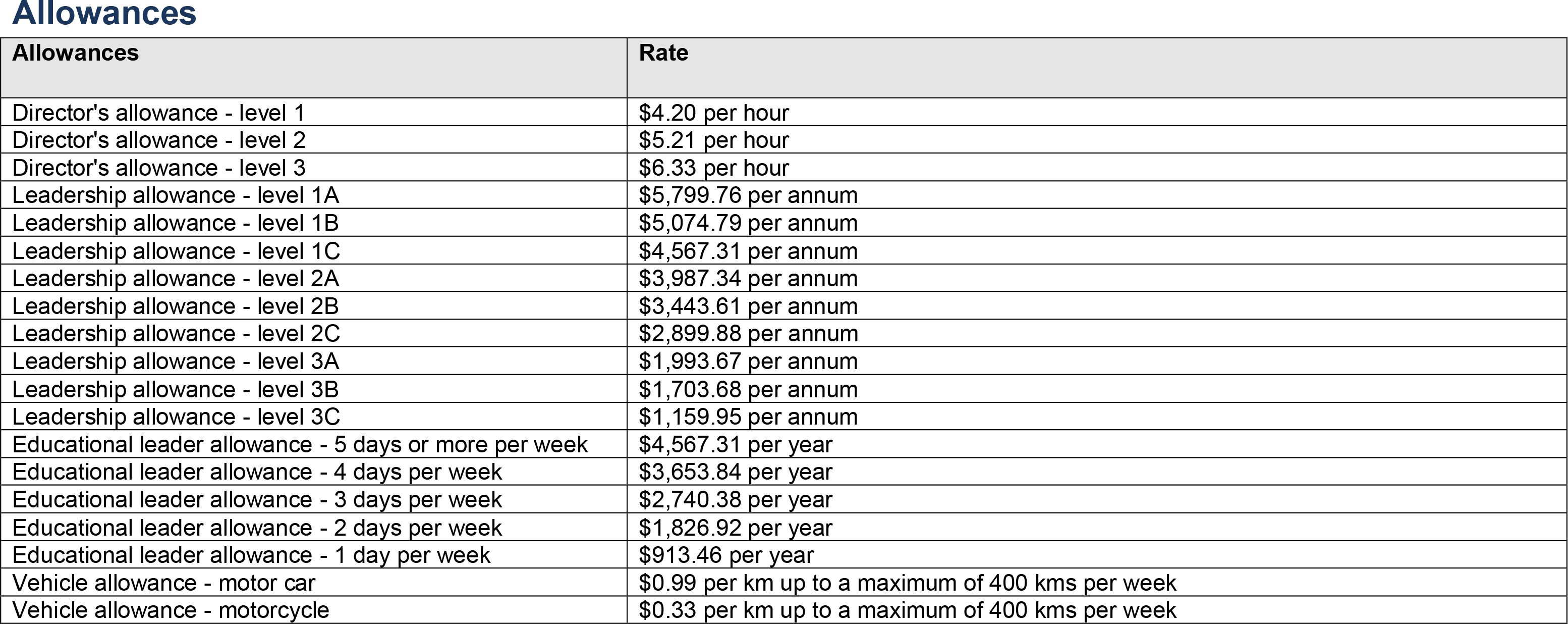When working as a qualified Early Childhood Teacher (with a university degree) within a service, your rate of pay will come from the Educational Services Teachers Award, 2010. This Award is specifically for Early Childhood Teachers employed as the ECT in their centre.
The following article will provide you with information on minimum wages, details of the level structure, progression to the next level, director allowance etc. The minimum wage table provided is referenced from the Early Childhood Teacher Award, 2010 and is updated and effective from 01 July 2023.
Classifications
- Level 1 - Graduate teacher and all other teachers (as defined) including those holding provisional or conditional accreditation /registration
- Level 2 - Teacher with proficient accreditation/registration or equivalent
- Level 3 - Teacher with proficient accreditation/registration or equivalent after 3 years’ satisfactory teaching service at Level 2
- Level 4 - Teacher with proficient accreditation/registration or equivalent after 3 years’ satisfactory teaching service at Level 3
- Level 5 - Teacher with Highly Accomplished / Lead Teacher accreditation/registration or equivalent.
Period Of Teaching Service
Teaching service means the total period a person has been employed as a teacher by any employer in the school education industry or the children’s services and early childhood education industry.
Teaching service does not include employment as a teacher in a TAFE program (unless the teacher is employed to teach a Vocational and Educational Training (VET) program) or in an English Language School.
Service as a part-time teacher will normally accrue on a pro rata basis according to the percentage of a full-time teaching load undertaken in any year. However, where the hours are more than 90% of a full-time load, service will count as a full-time year.
In the case of a casual employee, the equivalent of a full-time year of teaching service is 200 full casual days in Australian schools.
In the case of an early childhood/preschool teacher, the following will count as service:
- teaching experience in preschools ,kindergartens, multi-purpose centres, early intervention services ,long day care centre and other similar services;
- teaching experience of children from 4 to 8 years (or in the infants department) of a school registered and/or accredited under the relevant authority in each state or territory;
- service as a lecturer in early childhood education or child development, as a child development officer or equivalent; and
- service as a diploma qualified childcare worker, at the rate of one year for every 3 years’ service up to a maximum of 4 years.
Satisfactory Teaching Service
For the purpose of progression to Levels 3 and 4, satisfactory teaching service shall mean:
- maintenance of proficient accreditation/registration as a teacher, where applicable; and
- compliance with the requirements of the APST.
An employee will be deemed to have complied with the APST unless the employer has, in the 12-month period immediately preceding the date upon which the employee is due for progression to Level 3 or Level 4:
- identified, in writing, that the employee has not complied with the requirements of the APST in specified respects on an ongoing basis; and
- afforded the employee a reasonable period of time, with the provision of support, training and feedback, to bring the employee’s performance into compliance with the APST; and
- assessed the employee, in a formal and documented review of performance, as still not complying with the requirements of the APST on an ongoing basis.
Suppose the employee disputes an assessment that the employee has not complied with the requirements of the APST such as not to qualify for progression. In that case, the employer shall seek to resolve the dispute with the employee in accordance with the dispute resolution procedure.
Evidence Of Qualifications And Teaching Service
On engagement, the employer may require that the employee provide documentary evidence of qualifications and teaching service.
If an employer considers that the employee has not provided satisfactory evidence, and advises the employee in writing to this effect, then the employer may decline to recognise the relevant qualification or experience until evidence is provided. The employer will not unreasonably refuse to recognise the qualifications or teaching experience of an employee.
Where an employee has completed further teaching service with another employer (for example during unpaid leave) or additional qualifications after commencement of employment, they will be entitled to be classified accordingly and back paid from the date of completion of the experience or qualifications, provided the employee provided satisfactory evidence to the employer within 3 months of completion. In all other cases, the employee will be classified and paid from the date satisfactory evidence is provided.
Equivalency To Proficient Accreditation
For the purpose of Levels 2,3 and 4 of the classification structure an employee will have the equivalent to proficient accreditation if:
- the employee works in a State or Territory where there is no requirement applicable to the employee to be accredited or registered as a proficient teacher;
- the employee meets the APST applicable to a proficient teacher.
For this purpose, an employee will meet the APST applicable to a proficient teacher if the employee is assessed by the employer as doing so.
The following provisions apply to the assessment of an employee:
- An assessment must be conducted by the employer if the employee requests such an assessment at any time after the completion of the first year of teaching service, provided that no more than one such request may be made in any calendar year.
- An assessment must be conducted by the employer when the employee has completed 2 years of teaching service, even if the employee has not requested such an assessment.
- If the employer fails to conduct an assessment the employee will be deemed for the purpose of Levels 2,3 and 4 of the classification structure to have the equivalent to proficient accreditation.
- The assessment must be conducted in consultation with the employee.
- The employer and employee may agree to an identified expert assessor to conduct the assessment.
- If an employee is assessed as not meeting the APST applicable to a proficient teacher and this is disputed by the employee, the employer shall seek to resolve the dispute with the employee in accordance with the dispute resolution procedure.
Equivalency To Highly Accomplished/Lead Teacher Accreditation
For the purpose of Level 5 of the classification, an employee will have the equivalent to Highly Accomplished/Lead Teacher accreditation if:
- the employee works in a State or Territory where there is no capacity for the employee to obtain such accreditation; and
- the employee meets the APST applicable to a Highly Accomplished/Lead Teacher.
For the purpose of an employee will meet the APST applicable to a Highly Accomplished/Lead Teacher if the employer is assessed by the employer as doing so.
The following provisions apply to the assessment of an employee:
An assessment must be conducted by the employer if the employee requests such an assessment at any time after the completion of the first year of teaching service at Level 4, provided that no more than one such request may be made in any calendar year.
An assessment must be conducted by the employer when the employee has completed 3 years’ satisfactory teaching service at Level 4,even if the employee has not requested such an assessment.
If the employer fails to conduct an assessment in accordance, the employee will be deemed for the purpose of Level 5 of the classification structure to have the equivalent to Highly Accomplished/Lead Teacher accreditation.
The assessment must be conducted in consultation with the employee.
The employer and employee may agree to an identified expert assessor to conduct the assessment.
If an employee is assessed as not meeting the APST applicable to a Highly Accomplished/Lead Teacher and this is disputed by the employee, the employer shall seek to resolve the dispute with the employee in accordance with the dispute resolution procedure.
Returning To Teaching
A teacher with at least 2 years’ teaching service who was previously registered/accredited as proficient or who was not required to be registered/accredited as proficient who:
- is returning to teaching following a break of teaching service, where they have not obtained or maintained proficient status; or
- otherwise does not hold proficient accreditation/registration status; shall be classified on Level 2 for one year full-time equivalent teaching service, during which period the teacher may apply for proficient teacher accreditation or registration or apply for mutual recognition (in the case of an interstate teacher) with the relevant teacher accreditation authority.
Upon attaining proficient teacher accreditation or registration, the teacher will progress to the relevant Level between Level 2 and Level 4 based on their service at a proficient level. All service, in excess of two years, will count as service at a proficient level where that service has followed the attainment of a recognised teaching qualification.
If the teacher does not attain proficient teacher accreditation or registration within the one year full-time equivalent teaching service, the teacher will be paid at Level 1 until the teacher achieves proficient teacher accreditation. On such date the teacher will progress to the relevant Level between Level 2 and Level 4 based on their teaching service at a proficient level. All teaching service, in excess of 2 years, will count as teaching service at a proficient level where that teaching service has followed the attainment of a recognised teaching qualification.
Support For New Teachers
It is the responsibility of the individual Level 1 teacher to achieve accreditation or registration at the level of the proficient teacher within the required timeframes. The employer will support the Level 1 teacher to obtain accreditation or registration at the professional teacher standard, which will include reasonable release from ordinary duties for the Level 1 teacher operationally practicable.
If a Level 1 teacher has concerns regarding the support being provided by the employer, they should discuss the matter with the employer. If the matter remains unresolved, the matter may be dealt.
Non-Contact Time
An employee responsible for the preparation, implementation and/or evaluation of a developmental program for an individual child or group of children will be entitled to a minimum of two hours of non-contact time per week. During the non-contact time, an employee will not be required to supervise children or perform other duties as directed by the employer.
An employee appointed as the Educational Leader will be entitled to a minimum of two hours of non-contact time per week. During the non-contact time, an employee will not be required to supervise children or perform other duties as directed by the employer.
NOTE 1: Educational leader is defined in Regulation 118 of the Education and Care Services National Regulations (2011).
NOTE 2: An Educational Leader who also has programming responsibilities for an individual child or group of children will be entitled to a minimum of four hours of non-contact time per week.
Wages
The following rates for long daycare centres apply to a full-time employee who works in a children’s or early childhood service which usually provides services over a period of at least 8 hours each day for 48 weeks or more (such as a long daycare centre).


- The rates for long day care centres in the wage table above apply to a full-time employee who works in a children’s or early childhood service which usually provides services over a period of at least 8 hours each day for 48 weeks or more (such as a long day care centre). This rate is an additional 4% on the rates set out in the wage table for preschools and schools.

- A part-time employee who is appointed as a Director will be paid, in addition to the amounts payable, an allowance in on a proportionate basis to the hours they work.
- An employee required by the employer to act as a Director for at least 10 consecutive working days will be paid at the rate applicable to that position for the time they are in the position.
For further information and details on any points above, please read the following reference:
Educational Services Teachers Award, 2010 (information updated 01/07/2025)







 Here’s a comprehensive Mobile Phone and Smart Watch Policy tailored for early childhood education and care (ECEC) services in Australia, aligned with the latest 2025
Here’s a comprehensive Mobile Phone and Smart Watch Policy tailored for early childhood education and care (ECEC) services in Australia, aligned with the latest 2025 Across the early childhood education and care sector, educators are sounding the alarm: current staffing ratios are insufficient to deliver safe, meaningful, and developmentally appropriate
Across the early childhood education and care sector, educators are sounding the alarm: current staffing ratios are insufficient to deliver safe, meaningful, and developmentally appropriate Thanks to the new National Model Code and upcoming regulatory changes under the National Quality Framework (NQF), early childhood services across Australia must now implement
Thanks to the new National Model Code and upcoming regulatory changes under the National Quality Framework (NQF), early childhood services across Australia must now implement In the quiet hum of a weekday morning, something felt off. Preschool doors opened, but classrooms remained silent. No greetings. No redirection. No educators. And
In the quiet hum of a weekday morning, something felt off. Preschool doors opened, but classrooms remained silent. No greetings. No redirection. No educators. And A: In early childhood education and care (ECEC) settings across Australia, mobile phone use by educators is now subject to strict national reforms aimed at
A: In early childhood education and care (ECEC) settings across Australia, mobile phone use by educators is now subject to strict national reforms aimed at The end of the year is a busy and emotional time in early childhood services. Many services close for a short period over Christmas, and
The end of the year is a busy and emotional time in early childhood services. Many services close for a short period over Christmas, and In early childhood education and care, child safety is not just a number—it’s a practice. While educator-to-child ratios are essential, they are only one part
In early childhood education and care, child safety is not just a number—it’s a practice. While educator-to-child ratios are essential, they are only one part Being an educator is both rewarding and demanding. Between planning, documentation, room management, and supporting children’s wellbeing, the workload can feel overwhelming. That’s why practical
Being an educator is both rewarding and demanding. Between planning, documentation, room management, and supporting children’s wellbeing, the workload can feel overwhelming. That’s why practical A: Something as simple as a child asking to braid an educator’s hair—or children braiding each other’s can spark important questions about connection, trust, and
A: Something as simple as a child asking to braid an educator’s hair—or children braiding each other’s can spark important questions about connection, trust, and Here's a comprehensive, sector-responsive policy and procedure framework for the safe use of digital technologies—including CCTV—tailored for early childhood education settings. It balances child safety,
Here's a comprehensive, sector-responsive policy and procedure framework for the safe use of digital technologies—including CCTV—tailored for early childhood education settings. It balances child safety,


